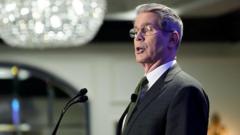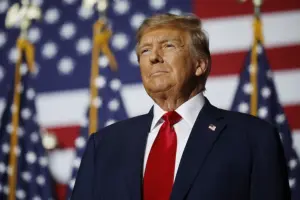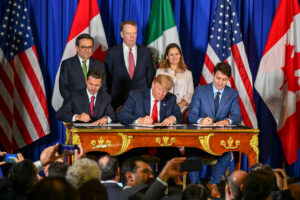In a recent speech, US Treasury Secretary Scott Bessent highlighted the potential for a major trade deal with China, urging the country to reduce its reliance on manufacturing exports for economic growth. His comments come amid heightened trade tensions that have led to increased tariffs between the two nations.
Potential Breakthrough in US-China Trade Relations, Says Treasury Secretary Bessent

Potential Breakthrough in US-China Trade Relations, Says Treasury Secretary Bessent
Treasury Secretary Scott Bessent emphasizes the possibility of a significant trade agreement between the US and China, contingent on Beijing's willingness to shift its economic focus.
In a notable address at the International Monetary Fund (IMF) conference, US Treasury Secretary Scott Bessent declared that there presents an "incredible opportunity" for a substantial trade agreement between the United States and China. Addressing reports of an impending meeting between the two countries, Bessent pointed out that a successful deal hinges on China's earnestness in diminishing its heavy reliance on manufacturing exports and embracing a domestic-driven economy.
"China needs to change. The country knows it needs to change. Everyone knows it needs to change. We want to assist in this transition because we, too, require a rebalancing," he stated. These remarks arrive amid escalating tensions stemming from an ongoing trade war that has seen both nations impose significant tariffs on each other's goods.
The US President's stance has been characterized by the implementation of tariffs reaching as high as 145% on various Chinese imports, a move aimed at bolstering domestic manufacturing and protecting American jobs. In retaliation, China has responded with import taxes of up to 125% on US products.
During his comments, Bessent conveyed a sense of urgency, remarking that the current trade climate is "not a joke." He expressed optimism, suggesting the necessity for a collective commitment to rebalancing economic priorities, with the hope that China will take actionable steps towards easing its dependence on export-led manufacturing growth.
Furthermore, while discussing the trade war, Bessent urged for a reinvigoration of focus from the IMF and World Bank on their fundamental missions of ensuring economic stability and fostering development, which he felt had recently been diverted towards supplementary issues such as climate change and social concerns. "These issues are not the IMF's mission," he asserted, calling for a refocus on their original mandates.
As the global community watches closely, the potential for a cooperative trade dialogue between these two economic giants remains a pivotal storyline in easing tensions and fostering healthier trade relations.





















